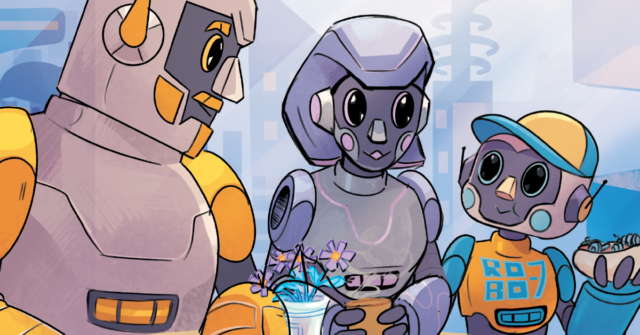
Teri Lesesne and I were never the teachers with the cute independent reading activities. Our classroom libraries, while extensive, would not be called Pinterest-worthy. We didn’t promote or create reading competitions between our students or classes. We didn’t reward kids with prizes for reading. We believed that reading was a reward of its own. As lifelong readers, as teachers, as parents, and as grandparents, we had seen firsthand how reading could bring comfort or adventure, could expand a worldview, or could simply make people feel less alone. We knew that readers didn’t need to be bribed to read. In spite of our refusal to externally reward reading, we were able to connect thousands of kids with books and reading over our careers. Many are still reading avidly into their adult lives. We have encountered hundreds of teachers and librarians who can say the same.

Teri and I knew that not every kid will fall in love with reading like we did growing up. We’re both pragmatists, and we understood that everyone isn’t destined to become a voracious reader who devours books. At the same time, we never lowered our expectations: we knew that our students could enjoy reading more than they did. Every kid should have the chance to connect with reading. Sadly, too many young people never get this opportunity.
When Teri and I promoted reading joy in our professional lives, we knew we were going to encounter colleagues and community members who dismissed it as a topic of little concern or importance. We heard this negativity often. Sadly, some adults feel that whether or not students enjoy reading isn’t within their control or isn’t their responsibility. After all, it doesn’t matter if kids like reading or not, does it? As long as they do well enough in school and pass reading tests? People who enjoy reading outside of school and work are outliers. Reading joy is not a necessary or expected outcome of learning how to read. We’ve heard it all. 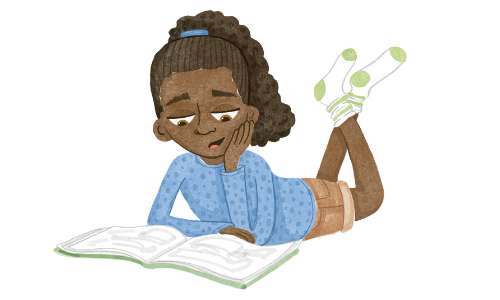 Even when kids enjoy reading, they often feel that they should not. Talking with many readers, an alarming amount told us that they received negative messaging about their reading habits from their family members, friends, work associates, and teachers. If you read “too much,” you’re nerdy or weird. If you like science fiction, horror, romance, or other popular fiction, you aren’t smart or educated. If kids like a particular format, book, or series, it must lack rigor, and therefore it’s a waste of time. As a teacher, I have never talked with a caregiver who thought their child had an unhealthy obsession with football or music, but I have talked to more than a few who were concerned their child was socially stunted because they liked to sit in a corner and read sometimes.
Even when kids enjoy reading, they often feel that they should not. Talking with many readers, an alarming amount told us that they received negative messaging about their reading habits from their family members, friends, work associates, and teachers. If you read “too much,” you’re nerdy or weird. If you like science fiction, horror, romance, or other popular fiction, you aren’t smart or educated. If kids like a particular format, book, or series, it must lack rigor, and therefore it’s a waste of time. As a teacher, I have never talked with a caregiver who thought their child had an unhealthy obsession with football or music, but I have talked to more than a few who were concerned their child was socially stunted because they liked to sit in a corner and read sometimes.
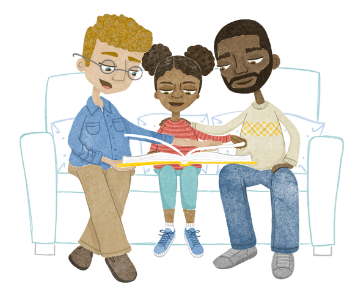 In families where reading is part of their home lives, many parents told us that they have to actively subvert or counteract the negative messaging their kids receive about reading from school. Their kids come home and announce that graphic novels aren’t real reading or that they are too old for nightly read alouds because they hear this at school. From adults. School expectations and beliefs about reading override those of kids and families. Teri and I both experienced how schools can undermine home reading values with our own kids and grandkids.
In families where reading is part of their home lives, many parents told us that they have to actively subvert or counteract the negative messaging their kids receive about reading from school. Their kids come home and announce that graphic novels aren’t real reading or that they are too old for nightly read alouds because they hear this at school. From adults. School expectations and beliefs about reading override those of kids and families. Teri and I both experienced how schools can undermine home reading values with our own kids and grandkids.
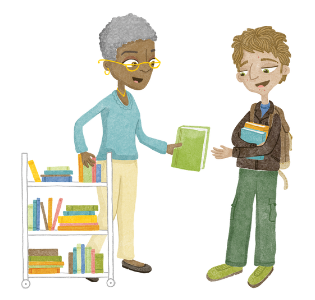
What would classrooms and libraries look like if more adults were enthusiastic reading advocates and kids had the resources and mentors they needed to become joyful readers?
This is the question that inspired The Joy of Reading and led Teri and me on a seven-year long journey to study readers and what makes reading joyful for them (and doesn’t). As we considered the data Teri collected from her graduate students’ reading autobiographies and the observations we both made from our years as classroom teachers, we identified some common resources and attitudes that helped people of all ages become (and remain) joyful readers, including:
- Time to read.
- Access to reading material.
- Choice in what to read and how to read it.
- Communities that encourage positive interactions with reading.
- Authentic reading response opportunities.
Many of these components are well-known to educators and community leaders, and yet, children and adolescents have never received them equitably and consistently at school. Kids need to read in volume—they need to read a lot. And they need to read widely—they need to read a lot of different texts. Unfortunately, too many kids report that they find little enjoyment in reading and do not invest much time or effort in doing it. To excel at reading, kids need to find joy in reading.
 Along with ensuring kids have time, access, and choice, adults can go a long way toward encouraging kids to read by simply talking about reading like it’s supposed be enjoyable. Instead of turning reading into medicine that’s awful, but good for you, why not communicate that reading can be joyful?
Along with ensuring kids have time, access, and choice, adults can go a long way toward encouraging kids to read by simply talking about reading like it’s supposed be enjoyable. Instead of turning reading into medicine that’s awful, but good for you, why not communicate that reading can be joyful?
Talking with scores of kids, we heard a lot of them say they don’t see any personal value in reading beyond school. Dedicating a few days a year toward celebrating reading or recognizing readers is not enough. Kids internalize the messaging they pick up about reading on a daily basis.
When adults act as if joy doesn’t matter, they’re disregarding readers’ engagement, motivation, experiences, and tastes--all factors that affect learning and interest in reading. And if you think that readers’ desire to read and their connections with reading don’t matter, I have a list of middle schoolers who would like to talk with you. Reading joy isn’t frivolous. It’s foundational to a lifelong orientation toward reading. How can we expect kids to become confident, competent readers if they hate reading and do it as little as possible?
No summer reading kickoff party or Star Reader pencil can undo a year of negative reading experiences for kids. Moments of reading fun are fleeting and often boil down to reading bribes or rewarding kids who already like to read. Not a single adult reader Teri and I spoke with became a lifelong reader because of a pizza or ice cream coupon reward in childhood. Almost all of them named influential people in their lives who encouraged them to read—parents, grandparents, siblings, librarians, teachers, and friends. Showing how reading can be a lifelong pursuit—rich with personal rewards—lasts longer than an ice cream cone.
When more adults believe it, more kids will, too.
I hope you all find some reading joy for yourselves this summer. Ice cream optional.
-Donalyn
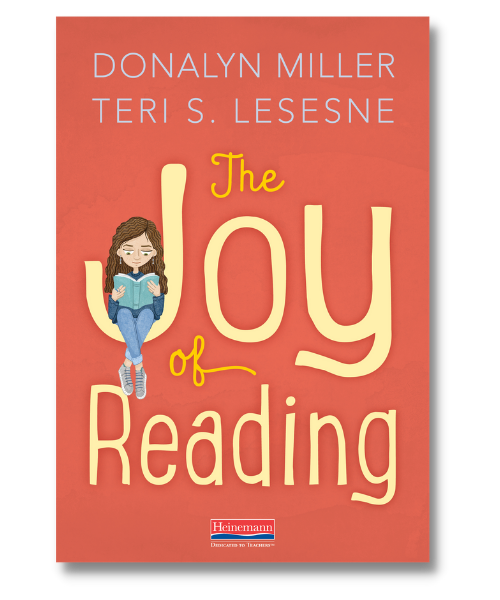
To learn more about The Joy of Reading visit Heinemann.com.
Browse more blogs featuring The Joy of Reading, including a special podcast episode with Donalyn Miller.
Donalyn Miller’s work champions self-selected independent reading, providing guidance and resources that foster children’s love of reading and the development of positive reading identities. A national and international consultant and bestselling author, Donalyn’s published works include The Book Whisperer (Jossey-Bass, 2009), Reading in the Wild (Jossey-Bass, 2013), and Game Changer: Book Access for All Kids (co-written with Colby Sharp, Scholastic, 2018) as well as articles in Gifted Child International, Education Week Teacher, The Reading Teacher, Voices From the Middle, Educational Leadership, Horn Book, School Library Journal, and The Washington Post.
Teri Lesesne's long and influential career was devoted to readers. Author of several books, including Reading Ladders and The Joy of Reading, she was known for the passion she brought to connecting readers with books. Teri was a middle-school teacher, a Distinguished Professor the department of Library Science at Sam Houston State University, Executive Director of ALAN (the Assembly on Literature for Adolescents of the National Council of Teachers of English), a National Book Award judge, and recipient of the 2007 ALAN award for her significant contributions to the field. Known to many as "Professor Nana," Teri’s legacy lives on in the librarians and teachers her work has nurtured.



